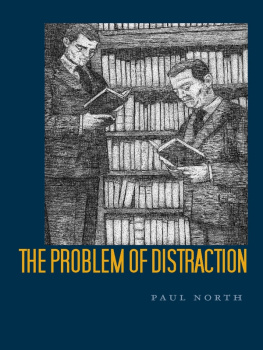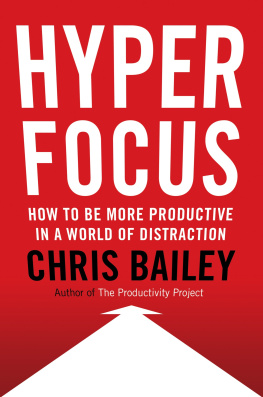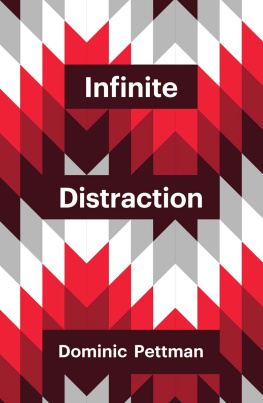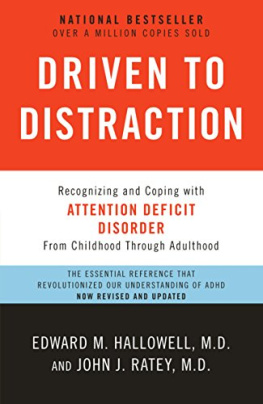Stanford University Press
Stanford, California
2012 by the Board of Trustees of the Leland Stanford Junior University.
All rights reserved.
This book was published with the assistance of the Frederick W. Hilles Publication Fund of Yale University.
No part of this book may be reproduced or transmitted in any form or by any means, electronic or mechanical, including photocopying and recording, or in any information storage or retrieval system without the prior written permission of Stanford University Press.
Printed in the United States of America on acid-free, archival-quality paper
Library of Congress Cataloging-in-Publication Data
North, Paul, 1971author.
The problem of distraction / Paul North.
pages cm
Includes bibliographical references and index.
ISBN 978-0-8047-7538-0 (cloth : alk. paper)
1. Distraction (Philosophy) 2. Philosophy, Modern. I. Title.
B105.D58N67 2011
128.3dc22
2010051611
E-book ISBN: 978-0-8047-7897-8
THE PROBLEM OF DISTRACTION
Paul North

THE PROBLEM OF DISTRACTION
For my parents
In te, anime meus, tempora mea metior. Noli mihi obstrepere; quod est, noli tibi obstrepere turbis affectionum tuarum.
In you, O my mind, I measure my times. Do not interrupt me; that is, do not interrupt yourself with a disturbance of your affections.
AUGUSTINE, Confessions
Acknowledgments
Peter Fenves, Werner Hamacher, and Samuel Weber provided indispensible insights and criticisms during the research and writing of this book. I am deeply grateful to them for their guidance. I am also beholden to people who shared thoughts on distraction in innumerable conversations: Anthony Adler, Giorgio Agamben, Carolina Baffi, David Ferris, Paul Fleming, Janet Frigo, Rodolphe Gasch, Eckart Goebel, Roshen Hendrickson, Andrew Libby, Avital Ronell, Robert Ryder, Thomas Schestag, Kenneth Schwarz, and Friese Undine. Critical comments on individual chapters by Corinne Bayerl and Barbara Cassin were invaluable in revising. Accuracy in the French, Ancient Greek, German, and Latin quotations and translations is due to the careful attention of Benjamin Hoffmann, Maya Gupta, and Thomas Stachel.
PROLOGUE
Primal Distraction
There is no distraction today, even though one often hears there are too many distractions. Yes, this is the age of distraction; many have called it that. For a hundred years or more (in actuality fifteen hundred, since Augustine), the disintegration of attention has been lamented, and every new decade and discipline seems to offer a new explanation and remedy for the loss. Education calls out the attention brigades to fight the shifty figure that steals away our focus. Have we won the war on distraction? A more primary question would be: have we found the enemy we are hunting? Commerce wrestles over the splinters of awareness that technology has shattered. Psychology struggles to get a hold on concentration, mainly against children, even though these same children will soon be required to multi-task and are already clicking and scanning and surfing. Why cure them of what is surely a timely habit? Statistics and politicians battle drivers lapses; new media gather up the shards of culture from the broken cult. Drugged up, warned off, lured in, and made to swallow theories about a society in distraction, few have the presence of mind left to ask: what is this pervasive evil? What is the meaning of the word, the truth of the phenomenon, and moreover, who will tell the story of its arrival in this history and its fetishization in reasonable discourse?
Who can say they understand distraction?
The English word calls up several images: a mathematics of division; a morality of bad choices; a movement of dispersion across a grid of more and more disparate points; a diminishment of strength, quality, or purity; vices or quasi-vices that produce pleasure without work: amusement, diversion, entertainment. All these are practiced by notorious figures, by sidetracked workers, bored students, and dissolute citizens, by the daydreamer, the sleeper who doesnt dream, the absentminded one. At the farthest limit, the least collected, the least with it, lie the dead, who are permanently elsewhere. Which one or more of these do we mean when we say distraction? Burdened with the label, occupants of an age named for our chief failing, we mean, almost inevitably, when we say distraction, the lack of attention. And we know it is a fundamental thing we are lacking. Today we lack that which makes us most fundamentally ourselves, and so we credit the force that could steal the fundament from us with great powers, such that powerful acts are needed to contain it.
This furtive and destructive force, a distraction not only equal to but possibly also stronger than attention, is not the subject of this book. It must beit isthe starting point for a prologue to the problem of distraction, but only insofar as we can quickly move through the common understanding before arriving at a different distraction, beyond the anxieties about attention that appear to determine it fully.
Disciplines cling to attention; they desire it as one desires a solution to a problem even when the outlines of the problem are still fuzzy. They write about it, lament its perversion or breakdown, and act with uncommon urgency to bring it back when it is not at hand. This is the most common circumstance in which attention appears. When it makes itself unavailable, attention becomes the object of an anxious search. Attention intensifies most, you might say, in its loss; it becomes itself when one goes in search of it. Producing itself out of fear of its unavailability, through this fiction, it must be pulled back continually from an unknown place to which it has slipped away. In this way, attention depends on an internal reference to distraction. But this reference, in turn, never seems to produce its referent. Attention constitutes itself by saving itself from a distraction whose meaning or image is even less articulable than the attention we say distraction is not.
A tautology seems to block our inquiry here. The non-attention whose negation forms the most common origin for attention can only be specified from the perspective of attention. So let us start again, taking our departure from what is presumed to be the primary term. Although it is often described on analogy with vision, attention has other attributes worth noting. Attention is patient; it has fortitude, is obsessive even, about its activity and its objects, and, continuing in this direction, the content of its patience and the object of its obsession is greed. This is its self-referential core: it holds greedily onto greed. The hand of attention stretches out, adtenere, toward the things it wishes to take and possess, and it compels itself to do so again and again. Attention is a name for a will to possession that is comparable to vision only insofar as vision is also thought of as willful and possessive. One idea of sight co-originates with attention in this will. The more restrictive of the two is clearly attentionthere can be attentive and non-attentive vision. Above all, at least in the common understanding, attention always possesses a unit, even if the unit is a conjunction of a few objects. And it possesses the unit alone, abandoning other units to other faculties or disciplines (to handle in the same way, greedily, administering their ownership defensively against other disciplines). Only to its own thing does attention give the gift of undividedness, and the gift often brings with it a share of defensive violence. The opposite of this possessiveness, we are led to assume, is distraction. Distraction either does not appropriate or impedes appropriation. Perhaps it is not even greedy about its own tendencies; it shifts, undervalues itself, gives itself away. Thus, when a disciplinea
Next page













